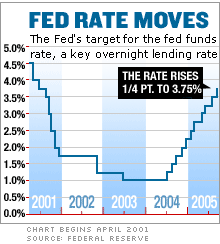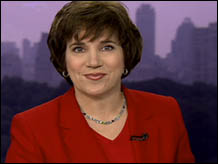 |
|
|
|
|
|
|
|
|
|
|
|
|

|
| CNN's Kathleen Hays reports on the Fed raising a key short-term interest rate another quarter point to 3.75 percent. (September 20) |
Play video
|
|
|
|
NEW YORK (CNN/Money) – The Federal Reserve should consider adopting the U.S. Postal Service's unofficial motto and tweaking it, just a bit.
"Neither snow nor rain nor heat nor gloom of night stays these governors from the swift completion of their appointed rounds of rate hikes."
When the Fed raised its target for a key short-term interest rate to 3.75 percent Tuesday, it proved that not even a hurricane would keep Alan Greenspan and fellow policy-makers from abandoning their plan of "measured" rate hikes for the foreseeable future. The rate hike demonstrated that the central bank is clearly more worried about inflation than any hit to growth.
According to fed funds future contracts listed on the Chicago Board of Trade, traders are now pricing in a quarter-point increase at the Fed's Nov. 1 meeting as well, when just a few weeks ago, many economists and investors were talking about a pause.
"A rate hike in November is without a doubt a given. We're staring 4 percent in the face," said John Norris, chief economist with Morgan Asset Management in Birmingham, Ala.
Richard Yamarone, director of economic research with Argus Research, a New York-based independent research firm, thinks the Fed won't stop in November either. "If they didn't pause after Katrina, they are not going to pause in the next few months."
In its statement, the nation's central bank conceded that "spending, production, and employment will be set back in the near term" as a result of Katrina but added that "these unfortunate developments...do not pose a more persistent threat." To read the full statement click here.
The great rate debate
But with the yield on the 10-year Treasury bond at about 4.18 percent, there is growing concern that the short-term rates could move higher than long-term bond rates, a so-called inverted yield curve that has been an accurate predictor of recession.
As such, some are worried that the Fed will boost rates one too many times.
"The Fed often overshoots and I think you have to prepare for that outcome," said Alan Skrainka, chief investment strategist with Edward Jones in St. Louis.
With that in mind, Norris thinks the Fed should pay attention to what bond investors are saying, namely that they are more concerned about a slowdown than a pickup in inflation.
"As smart as people at the Fed are, I would hate to argue with millions of investors that are pretty smart as well," he said. "I don't think there is any doubt Greenspan would like to see an increase in 10-year bond rates but the Fed keeps saying inflation is contained and as long as you say that, you can't get upset with the bond market."
Others think the Fed is correct to stick to its plan of measured rate hikes in order to keep inflation at bay.
Yamarone said Katrina shouldn't have changed the Fed's thinking and even if Hurricane Rita causes significant damage, the Fed should still stay on course.
"The Federal Reserve can do nothing to change the consequences of Katrina and presumably Rita," he said. "What they can do is combat one of the conditions that has clearly surfaced and that is inflation."
Anirvan Banerji, director of research with the Economic Cycle Research Institute in New York, also thinks that fears of a Fed-induced slowdown resulting from too many rate hikes are off the mark. He thinks a pause in the near future would be a mistake since the economy still appears to be strong.
"Right now the basic premise for some is that pre-Katrina data is irrelevant and post-Katrina data will be distorted so why not pause. But I think that's a cop out," Banerji said. "Even with oil prices near record high levels and interest rates rising, we haven't seen anything close to a recession. The economy is resilient."
Is inflation a real threat?
But some wonder whether inflation is becoming more of a threat.
Skrainka at Edward Jones said that the biggest source of inflation pressures would come not from oil but the job market. And he thinks there has yet to be any significant pickup in wage growth just yet to send any alarm signals about inflation.
"I'm hopeful that we're nearing the end of this series of tightening. I don't think we have a serious inflation problem," said Skrainka. "With strong productivity, unit labor costs are under control."
Morgan's Norris agrees. He argues that outside of energy, there has yet to be a broad-based spike in prices.
"Core inflation is low. There is no Carter administration-esque inflation looming around the bend," he said, referring to the crippling inflation of the late 1970s.
But Banerji thinks that the Fed has to depend on what it sees in economic data. Barring tangible evidence of a slowdown, he believes the Fed must stick with its inflation-fighting script.
"It is very simple. The story is still about growth and about inflation," he said. "There will be a temporary hit to growth undoubtedly but not as much concern about long-lasting damage."
C.T. Urban, senior portfolio manager of Caterpillar Investment Management and manager of the Preferred Short-Term Government Securities bond fund, added that the only thing that should sway the Fed from its "measured" stance would be if consumers started to substantially cut spending due to high energy prices. "Otherwise, it's business as usual," he said.
Still, Norris thinks there is time for the Fed to change its mind. He thinks the market would tolerate one more rate hike but after that the Fed needs to consider a pause, especially if long-term bond yields remain stubbornly low.
"If the Fed gets to 4 percent and they are still talking about a measured pace, that's when people will really start getting the jitters," he said.
For more on the Fed and rates, click here.
For more about the bond market, click here.

|